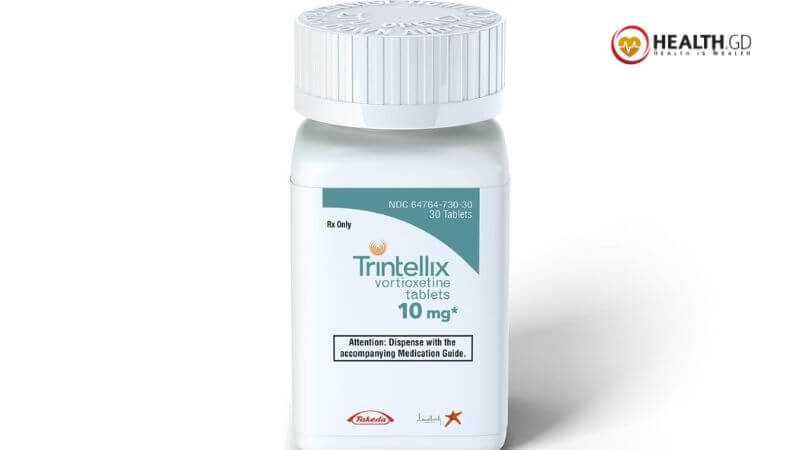Trintellix side effects increase suicidal thoughts and behaviour in children, adolescents, and young adults. If you think about suicide while using Trintellix, notify your doctor.
If you experience these significant side effects, seek medical attention: Suddenly losing eyesight, impaired vision, tunnel vision, eye discomfort or swelling, or seeing halos around lights are the adverse effects one can have with these antidepressants.
Other significant cardiac symptoms include rapid, irregular, or hammering heartbeats, chest fluttering, shortness of breath, abrupt dizziness, lightheadedness or fainting, severe headaches, disorientation, slurred speech, arm or leg weakness, problems walking, lack of coordination, unsteadiness, tight muscles, high temperature, heavy perspiration, or tremors.
Uses of Trintellix

This medicine treats depression. Restoration of brain serotonin equilibrium is its mechanism. SSRI and serotonin receptor modulator vortioxetine. This medicine may boost your mood, sleep, appetite, vitality, and interest in everyday life.
Before using Trintellix, also called vortioxetine, with each refill, read our blog on the Medication Guide. Your doctor may prescribe taking this medicine with or without meals once a day. The dose depends on your medical condition, treatment response, and other drugs. Inform your doctor and pharmacist of all your medications, including herbal remedies.
Trintellix Dosage
Start with 10 mg of Trintellix orally once a day without food. Increase dosage to 20 mg/day as tolerated. On the other hand, Trintellix interacts with drugs, supplements, and substances.
Trintellix may interact with MAOIs, SSRIs, SNRIs, triptans, buspirone, tramadol, tryptophan products, NSAIDs, aspirin, warfarin, bupropion, fluoxetine, paroxetine, quinidine, rifampicin, carbamazepine, and phenytoin. Inform your doctor of any drugs and supplements.
Pregnancy, Breastfeeding and Trintellix
However, Trintellix’s antidepressant side effects are not mild; therefore, use Trintellix only if recommended during pregnancy. It is unknown whether it affects fetuses. Thus, for precautionary measures, do not breastfeed while using Trintellix.
Trintellix antidepressant side effects in the latter three months of pregnancy may produce withdrawal symptoms, significant lung difficulties, or other infant issues. However, quitting the medication may be unsafe. Do not start or discontinue Trintellix without medical approval.
Before Using This Medication

Those who are allergic to vortioxetine should not use Trintellix. Trintellix antidepressant side effects are worse when one stops suddenly using it; you must wait 21 days before taking an MAO inhibitor. Tell your doctor if you use stimulants, opioids, herbal items, drugs for depression, mental illness, Parkinson’s disease, migraine headaches, severe infections, or nausea and vomiting prevention.
Moreover, Trintellix interactions may produce serotonin syndrome. To ensure Trintellix anti-depressant side effects, inform your doctor of any history of bipolar illness, substance misuse, suicidal thoughts, glaucoma, seizures, epilepsy, bleeding issues, or low sodium levels.
Some young individuals think about suicide after using an antidepressant. Visit your doctor regularly to assess your progress. Your relatives or caregivers should also notice mood or symptom changes.
Threats and Acts of Suicide
During the first few months of medication or dosage changes, Trintellix antidepressant side effects and other antidepressants increase the risk of suicidal thoughts and behaviour in persons under 24. More importantly, TRINTELLIX is not for kids. Depression and other mental diseases drive most suicidal thoughts and behaviours. Pay attention to any changes, remarkably abrupt mood, behaviour, cognition, or emotion changes, or suicidal thoughts or acts.
Contact your doctor or emergency services immediately if you have any of these or symptoms like suicidal thoughts or actions, impulsivity, aggressive or violent acts, depression, anxiety or panic attacks, agitation, restlessness, anger, irritability, trouble sleeping, an increase in activity or talking, or other unusual changes in behaviour or mood, especially if they are new, worse, or worrying you.
What Are TRINTELLIX’s Side Effects?

TRINTELLIX may cause serotonin syndrome, a potentially life-threatening issue when used with certain medications. If you experience any of these serotonin syndrome symptoms, call your doctor or go to the ER: agitation, seeing or hearing things that are not real, confusion, coma, rapid heartbeat, blood pressure fluctuations, dizziness, sweating, flushing, high body temperature, shaking, rigid muscles, twitching, lack of coordination; seizures, nausea, vomiting, etc.
Consult with a doctor before taking TRINTELLIX with other medicine.
Taking TRINTELLIX with aspirin, NSAIDs, warfarin, or blood thinners may increase bleeding risk. Immediately report unusual bleeding or bruises to your doctor.
However, bipolar disorder patients using TRINTELLIX may have manic episodes. Symptoms include increased energy, racing thoughts, lofty ideas, talking more or quicker than usual, significant sleep difficulties, risky conduct, extreme cheerfulness or anger.
1. Discontinuation Syndrome
Stopping TRINTELLIX suddenly can cause nausea, sweating, mood changes, irritability, agitation, dizziness, electric shock, tremors, anxiety, confusion, headache, tiredness, problems sleeping, hypomania, ringing in the ears, and seizures.
In particular, for persons with underlying eye diseases, TRINTELLIX may develop angle-closure glaucoma. You may desire an eye exam to determine your risk and obtain preventive therapy. Contact your doctor if you experience eye discomfort, vision problems, swelling, or redness.
2. Low Blood Sodium
TRINTELLIX may induce life-threatening low blood sodium levels. People over 65 and those taking certain medications may have low blood salt levels. Headaches, trouble focusing, memory problems, disorientation, weakness, and unsteadiness on your feet might lead to falls. In severe or abrupt instances, symptoms include seeing or hearing things that are not real, fainting, convulsions, coma, and ceasing breathing.
3. Sexual Issues With Taking Trintellix
Taking TRINTELLIX may create sexual issues. Male symptoms may include delay or inability to ejaculate, diminished sex desire, or erection problems. Reduced sex desire, delayed orgasm, or inability to orgasm are female symptoms. If your sexual function changes or you have questions or concerns during TRINTELLIX therapy, talk to your doctor.
The Most Common TRINTELLIX Effects Are:
- Nausea
- Constipation
- Vomiting
Do not take Trintellix if you have used an MAO inhibitor such as isocarboxazid, methylene blue injection, phenelzine, tranylcypromine, or others in the prior 14 days. After stopping Trintellix, you must wait 21 days before taking an MAO inhibitor. Some young individuals think about suicide after using an antidepressant. Be aware of mood or symptom changes.
Report any new or worsening symptoms to your doctor, such as mood or behaviour changes, anxiety, panic attacks, trouble sleeping, impulsivity, irritability, agitation, hostility, aggression, restlessness, hyperactivity (mentally or physically), depression, or thoughts about suicide or self-harm. Never give Trintellix to children under 18 without medical guidance. This medication is not for kids.
Upsides
- Adults with MDD may take Trintellix.
- Off-label, Trintellix treats generalized anxiety disorder (GAD). Severe GAD (HAMA >25) seemed to benefit the most.
- Trintellix is a daily oral pill.
- Take with or without a meal.
- Trintellix directly targets serotonin receptors and prevents reuptake, unlike other antidepressants.
- Compared to tricyclics, MAOIs, and SSRIs, Trintellix seldom causes weight gain.
- Most individuals should observe depression symptoms lessen after two weeks of medication, although Trintellix may take four weeks or more to work fully.
Downsides
- The following adverse effects are more common if you are 18–60, take no other medicine, or have no other medical conditions:
- The most prevalent negative impact is nausea, which may occur in up to 32% of Trintellix 20 mg/day users. Other gastrointestinal adverse effects include diarrhea, dry mouth, constipation, and vomiting.
- You may also have dizziness, weird dreams, pruritus, and sexual dysfunction.
Conclusion
As with other antidepressants, Trintellix may raise the risk of suicidal thoughts or actions, especially in children and young people under 24. However, watch for mood decline.
However, Interaction or overdosage may produce serotonin syndrome (agitation, hallucinations, coma, delirium, high heart rate, dizziness, flushing, muscular tremor or stiffness, nausea, vomiting, or diarrhea).
Lastly, stopping suddenly from using this may cause headaches, mood changes, irritability, dizziness, and a runny nose. It reduces to 10 mg/day per week before discontinuing. Get medical attention if Trintellix causes rash, edema, or trouble breathing.








